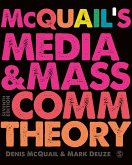

Alle Infos zum eBook verschenken

- Format: PDF
- Merkliste
- Auf die Merkliste
- Bewerten Bewerten
- Teilen
- Produkt teilen
- Produkterinnerung
- Produkterinnerung

Hier können Sie sich einloggen

Bitte loggen Sie sich zunächst in Ihr Kundenkonto ein oder registrieren Sie sich bei bücher.de, um das eBook-Abo tolino select nutzen zu können.
Mass communication has long been recognized as an important contributor to national identity and nation building. This book examines the relationship between media and nationalism in Israel, arguing that, in comparison to other countries, the Israeli case is unique. It explores the roots and evolution of newspapers, journalism, radio, television, and the debut of the Internet on both the cultural and the institutional levels, and examines milestones in the socio-political development of Hebrew and Israeli mass communication. In evaluating the technological changes in the media, the book shows…mehr
- Geräte: PC
- mit Kopierschutz
- eBook Hilfe
- Größe: 1.52MB
- FamilySharing(5)
![Mass Communication Theories (eBook, PDF) Mass Communication Theories (eBook, PDF)]() Melvin L. DefleurMass Communication Theories (eBook, PDF)51,95 €
Melvin L. DefleurMass Communication Theories (eBook, PDF)51,95 €![McQuail's Media and Mass Communication Theory (eBook, PDF) McQuail's Media and Mass Communication Theory (eBook, PDF)]() Denis McquailMcQuail's Media and Mass Communication Theory (eBook, PDF)49,95 €
Denis McquailMcQuail's Media and Mass Communication Theory (eBook, PDF)49,95 €![Mass Communications and Media Studies (eBook, PDF) Mass Communications and Media Studies (eBook, PDF)]() Peyton PaxsonMass Communications and Media Studies (eBook, PDF)23,95 €
Peyton PaxsonMass Communications and Media Studies (eBook, PDF)23,95 €![Women in Mass Communication (eBook, PDF) Women in Mass Communication (eBook, PDF)]() Women in Mass Communication (eBook, PDF)36,95 €
Women in Mass Communication (eBook, PDF)36,95 €![The Illustrated Guide to the Mass Communication Research Project (eBook, PDF) The Illustrated Guide to the Mass Communication Research Project (eBook, PDF)]() Patricia SwannThe Illustrated Guide to the Mass Communication Research Project (eBook, PDF)49,95 €
Patricia SwannThe Illustrated Guide to the Mass Communication Research Project (eBook, PDF)49,95 €![Mass Communications Research Methods (eBook, PDF) Mass Communications Research Methods (eBook, PDF)]() H. J. HsiaMass Communications Research Methods (eBook, PDF)40,95 €
H. J. HsiaMass Communications Research Methods (eBook, PDF)40,95 €![Globalization, Development and the Mass Media (eBook, PDF) Globalization, Development and the Mass Media (eBook, PDF)]() Colin SparksGlobalization, Development and the Mass Media (eBook, PDF)65,95 €
Colin SparksGlobalization, Development and the Mass Media (eBook, PDF)65,95 €-
-
-
Dieser Download kann aus rechtlichen Gründen nur mit Rechnungsadresse in A, B, BG, CY, CZ, D, DK, EW, E, FIN, F, GR, HR, H, IRL, I, LT, L, LR, M, NL, PL, P, R, S, SLO, SK ausgeliefert werden.
- Produktdetails
- Verlag: Berghahn Books
- Seitenzahl: 238
- Erscheinungstermin: 30. November 2014
- Englisch
- ISBN-13: 9781782384526
- Artikelnr.: 41827971
- Verlag: Berghahn Books
- Seitenzahl: 238
- Erscheinungstermin: 30. November 2014
- Englisch
- ISBN-13: 9781782384526
- Artikelnr.: 41827971
- Herstellerkennzeichnung Die Herstellerinformationen sind derzeit nicht verfügbar.
Introduction: Mass Communication-Nationalism, Globalization, and Social
Fragmentation
* The Structure of the Book
* The Nation: A Theoretical Framework
* Nationalism as a Communications Phenomenon
* Extreme Simultaneity: The Electronic Media
* New Technologies: The End of the Media National Role?
Chapter 1. The Evolution of the Hebrew and Israeli Press
* The Press and Nationalism
* From Political Party Press to Commercial Press
* The Beginnings of the Hebrew Press in Palestine during the Ottoman
Era
* The Press in Mandatory Times
* The Political Party Press in the Yishuv Era
* Private Press in the Yishuv Era
* The Palestinian press in the Yishuv era
* The Press in the State of Israel
* Regulation of the Press: Official and Other Arrangements
* Party Political Press in the State of Israel
* The Commercial Press in the State of Israel
* The Rise and Fall of Local Newspapers
* The Arabic-language Press¿ Russian-language Press
* The Ultra-Orthodox Press
* The Press Crisis and the Advent of Free Newspapers
* Conclusion
Chapter 2. Radio in the State of Israel
* Radio and National Solidarity
* Historic Background: Radio in the Yishuv Era
* Radio in the State of Israel: Institutional Aspects
* Radio and Imagined Israeliness
* Special Broadcasts: From the Eichmann Trial to Eshkol's Speech
* Forerunners of Broadcasting Pluralism
* Galei Zahal (Army Radio)
* The Voice of Peace
* The Multichannel Radio Age: Diversification and Decentralization?
* Conclusion
Chapter 3. Television in Israel
* Television in the National Arena
* Public Broadcasting in Changing Times
* The "No-go" Era: The Television Debate in the State of Israel
* Educational Television
* The Founding of General Television
* Television in Israel: Institutional Aspects
* Chronicles of the Channel 1: Socio-cultural Aspects
* Educational Television
* Arab-Language Broadcasting
* Music, Imported Series, and Satire
* Hebrew-Language Television
* Documentaries and News Programs
* Television Broadcasting in the Single Channel Era: Summary
* Israel's Battle over Color TV: The Case of the "Eraser" and the
"Anti-Eraser"
* The Public Debate over Color Broadcasting
* The Anti-Eraser
* The Multichannel Era in Israel
* Commercial and Global Trends
* Television Broadcasts to Former Soviet Union (FSU) Immigrants
* Television Broadcasts for Arab Citizens in Israel
* Digital and Interactive Technology
* Conclusion
Chapter 4. The Internet's Debut in Israel
* Is the National Media Age Over?
* The Evolution of Internet Accessibility in Israel
* Israelis Surfing the Internet: Between the Local and the Global
* Internet Use among Children and Adolescents
* The Internet and Sectorial Communication
* Internet Use among Arab Citizens of Israel
* The Internet and the Ultra-orthodox Community
* Russian-language Internet Sites
* The Internet and the Public-Political Sphere in IsraelInternet
Discourse in a Security Crisis
Epilogue
List of sources
Index
Introduction: Mass Communication-Nationalism, Globalization, and Social
Fragmentation
* The Structure of the Book
* The Nation: A Theoretical Framework
* Nationalism as a Communications Phenomenon
* Extreme Simultaneity: The Electronic Media
* New Technologies: The End of the Media National Role?
Chapter 1. The Evolution of the Hebrew and Israeli Press
* The Press and Nationalism
* From Political Party Press to Commercial Press
* The Beginnings of the Hebrew Press in Palestine during the Ottoman
Era
* The Press in Mandatory Times
* The Political Party Press in the Yishuv Era
* Private Press in the Yishuv Era
* The Palestinian press in the Yishuv era
* The Press in the State of Israel
* Regulation of the Press: Official and Other Arrangements
* Party Political Press in the State of Israel
* The Commercial Press in the State of Israel
* The Rise and Fall of Local Newspapers
* The Arabic-language Press¿ Russian-language Press
* The Ultra-Orthodox Press
* The Press Crisis and the Advent of Free Newspapers
* Conclusion
Chapter 2. Radio in the State of Israel
* Radio and National Solidarity
* Historic Background: Radio in the Yishuv Era
* Radio in the State of Israel: Institutional Aspects
* Radio and Imagined Israeliness
* Special Broadcasts: From the Eichmann Trial to Eshkol's Speech
* Forerunners of Broadcasting Pluralism
* Galei Zahal (Army Radio)
* The Voice of Peace
* The Multichannel Radio Age: Diversification and Decentralization?
* Conclusion
Chapter 3. Television in Israel
* Television in the National Arena
* Public Broadcasting in Changing Times
* The "No-go" Era: The Television Debate in the State of Israel
* Educational Television
* The Founding of General Television
* Television in Israel: Institutional Aspects
* Chronicles of the Channel 1: Socio-cultural Aspects
* Educational Television
* Arab-Language Broadcasting
* Music, Imported Series, and Satire
* Hebrew-Language Television
* Documentaries and News Programs
* Television Broadcasting in the Single Channel Era: Summary
* Israel's Battle over Color TV: The Case of the "Eraser" and the
"Anti-Eraser"
* The Public Debate over Color Broadcasting
* The Anti-Eraser
* The Multichannel Era in Israel
* Commercial and Global Trends
* Television Broadcasts to Former Soviet Union (FSU) Immigrants
* Television Broadcasts for Arab Citizens in Israel
* Digital and Interactive Technology
* Conclusion
Chapter 4. The Internet's Debut in Israel
* Is the National Media Age Over?
* The Evolution of Internet Accessibility in Israel
* Israelis Surfing the Internet: Between the Local and the Global
* Internet Use among Children and Adolescents
* The Internet and Sectorial Communication
* Internet Use among Arab Citizens of Israel
* The Internet and the Ultra-orthodox Community
* Russian-language Internet Sites
* The Internet and the Public-Political Sphere in IsraelInternet
Discourse in a Security Crisis
Epilogue
List of sources
Index







